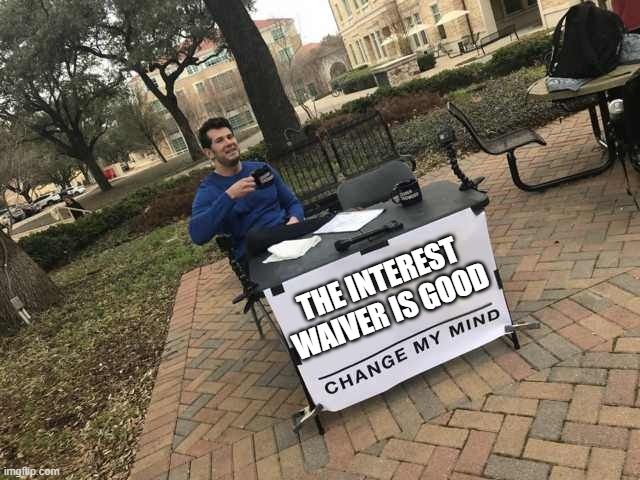The President, The Student Loan Interest Waiver, and You

What is it, how does it work, and how does it affect you?
Update: I have edited this post to more accurately reflect the details from the CARES act pertinent to student loans. I used this summary as my guide. If you are a borrower you should read this FAQ page from studentaid.gov
On March 13th President Trump announced an indefinite waiver on student loan interest on loans held by the federal government. What does that actually mean and how does it affect you? Here's a high level summary:
- The waiver could is retroactively effective as of March 13th, 2020
- Currently, the waiver is in effect for 60 days. However, loans in or entering forbearance will have this benefit for up to 6 months
- The Department of Education has indicated monthly payment amounts will not change. The full amount will be due and will be applied to the principal balance owed
- Only federal loans qualify, so most FFEL loans, Perkins loans held by an educational institution, and other private loans are not eligible
- In addition to loans in repayment, deferred payments and loans in forbearance would qualify for the interest waiver
- Anyone requests for forbearance on federally held loans will be granted for a 6 month period
- Refer to your loan servicers website for details on your payment and eligibility
- Employers can now claim up to $5,250 per employee in tax exclusions for student loan repayment contributions. Previously, this was limited to certain education expenses
You may be wondering why the President would waive interest on student loans given everything else that's going on. Well, there are over 45 million Americans carrying over $1.7 trillion in student debt. Why does everyone keep repeating this statistic and why is it so shocking? Americans owe about $1.2 trillion in auto loans and around $0.9 trillion in credit card debt. Let that sink in for a minute.
Student debt is almost the combined amount of auto loans and credit card debt.
That's a BFD. That's why everyone is concerned about it.

I see your principal and raise you interest
Say the average recent graduate owes $37,000 at a 5% interest rate over 10 years. The table below shows how their payment would look now versus with the waiver.
| payment | = | interest | + | principal | |
|---|---|---|---|---|---|
| without waiver | $392 | = | $154 | + | $238 |
| with waiver | $392 | = | $0 | + | $392 |
Even though the payment is the same size, the graduate would be paying approximately 65% more towards principal every month! This is important since interest is accrued on outstanding principal so lower principal translates to lower overall interest paid over the lifetime of the loan. Assuming the graduate applies for forbearance and with no interest for 6 months, here's the potential impact on the total amount paid over the lifetime of the loan:
| total paid | = | total interest | + | principal | |
|---|---|---|---|---|---|
| without waiver | $47,093 | = | $10,093 | + | $37,000 |
| with waiver | $45,639 | = | $8,639 | + | $37,000 |
This interest waiver could give a recent graduate $1,454 or 14.4% in savings over the lifetime of the loan. As someone might say, "that's yuuuuuuuge!"
Haters gonna hate

The biggest issue folks have with this waiver is that it doesn't have immediate economic impact. They argue that suspending payments or putting money directly into peoples' pockets may be better. Yes, in the short-term it could be better to give cash but why does it have to be an either / or? Loans are a long term game. The interest waiver acts to reduce that overall amount owed on the lifetime of the loans. Update: the stimulus package provides for both these options
Suspending payments on loans held by the federal government for 6 months would result in billions in deferrals and people would not come out any better off at the end of it. That's billions of dollars the government could instead give in direct subsidies to various struggling industries crucial to our daily lives or put directly into peoples' pockets. All while creating potential interest savings in the billions of dollars over the lifetime of student loans. Sounds like a win-win to me.
Making the most of it
While this student loan interest waiver has a big impact on the total amount paid over the lifetime of the loan it does favor those earlier in their loan payment lifecycle. It also means there is no immediate economic savings to people who are worried about how to make that next payment. That's the harsh reality of it.
If you are fortunate enough to have the funds to make your loan payments then put as much as you can towards those loans while they're not earning any interest. Most people aren't in that position. If you know someone that needs it, help them by offering to pay some of their loans. Employers are in the best position to really make a difference.
How do we make the most of it? Any employers thinking of ways to reduce their peoples' financial stress should take on all or part of their student loan payments. This will make a huge difference to the overall amount of money people end up having to cough up in the long run.
At Noether Rudin we're doing our part by donating our time and infrastructure to facilitate any student loan payment contributions employers want to make to their peoples' loans. At cost. No strings attached. If you want to do this for your people email us at hello@noetherrudin.com. If you want your employer to do this for you, pass them our email.
The Final Word
The student loan interest waiver is a fantastic opportunity to really drive down the total amount paid over the lifetime of loans. Though the waiver is limited to loans held by the federal government it still has the potential to make a massive impact to the long term financial health of the folks in debt by saving the average recent graduate about $1,454 or 14.4% over the lifetime of their loan.
We need to act as a community and try our best to find funds to direct to our fellow humans with student loans. Employers are in an especially good position to take some financial stress off their employees' plates by taking on most or all of their student loan payments and really making a difference.



